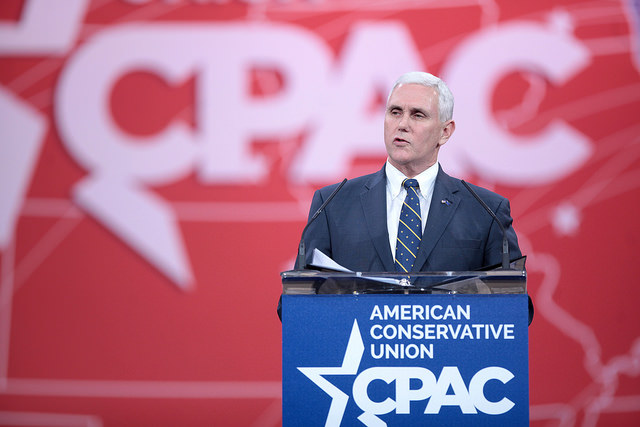
The reputation of US vice presidents has come a long way since Richard Nixon moved into the executive branch and filled offices in the White House in 1953. Prior to Nixon’s term, the VEEP held a legislative position presiding over the Senate, with little connection to the President. Fast-forward 60 years and modern-day vice presidents are essential members of the President’s policy team, trusted advisors and often the party’s nominee as successor. George H.W. Bush won the presidency in 1988 after eight years as Vice President, while Hubert Humphrey and Al Gore were nominated by their respective parties, but failed to win presidential elections.
Joe Biden has epitomised that transformation—as a master of Washington’s insider games, he’s become President Obama’s confidant and one of the most popular figures in US politics. After a horrific few weeks for Donald Trump—culminating in the Republican letter to cut RNC funding—it might well be left to his vice presidential running mate to pick up the pieces.
After months of whispers, late-night calls and semi-secret job interviews, Trump and Hillary Clinton recently locked in their respective vice presidential candidates—Mike Pence and Tim Kaine—with little controversy. Their selections were clear attempts to bring their parties’ base back into the fold, with both men considered to be experienced, well-liked and representative of their parties’ core constituencies.
Indiana Governor Mike Pence, Donald Trump’s running mate, has been widely regarded as a solid pick from a bunch that also featured the politically-untested General Mike Flynn, baggage-laden New Jersey Governor Chris Christie and former House speaker Newt Gingrich. Perhaps his most valuable asset is his ability to reach out the Republican Party establishment, who are increasingly sceptical about uniting around the unpredictable Trump. Pence is considered a trusted colleague and a principled conservative by Republican heavyweights Paul Ryan and Mitch McConnell; someone they know shares their party’s values and is cautious and to the point—the opposite of Trump.
Pence is also likely to appeal to social and fiscal conservatives; a group Trump has largely failed to engage thus far. Describing himself as ‘a Christian, a conservative and a Republican, in that order’, he’s been on the frontline in the fight to defund Planned Parenthood and is opposed to same-sex marriages and civil unions. He was one of only four governors to receive an ‘A’ grade in The Cato Institute’s 2014 ‘Fiscal Policy Report Card on America’s Governors’, championing cuts to Indiana’s corporate income tax rate and to business property taxes.
With 12 years in Congress and three-plus years as governor, Pence also provides the political experience that Trump is unmistakably missing. He’s a veteran legislator with a solid understanding of public policy, a successful negotiator and an efficient communicator—someone who knows how to get things done. That’s key to Trump’s White House bid, as his campaign manager Paul Manafort told The Huffington Post in May, Trump ‘needs an experienced person to do the part of the job he doesn’t want to do’. If Trump wins, it’s likely to be Pence running the US behind the scenes in 2017.
In contrast with Trump’s disastrous past fortnight on the campaign trail, Pence has exceeded expectations, displaying discipline and composure while maintaining his loyalty to the Republican nominee. He’s taken a stance on Trump’s comments suggesting Russia hacked Clinton’s emails, and Trump’s criticism of the Khan family. He has also endorsed Speaker Paul Ryan and Senator John McCain’s reelection campaigns and attempted to explain away Trump’s suggestions that gun owners could take action against Clinton. His performance is being rewarded—a Gallup poll released on 10 August put Pence’s favourability rating at 36%, ahead of Kaine, Trump and Clinton. Trump’s campaign desperately needs Pence to carry this momentum into the next three months if they have any chance of gaining ground on Clinton.
With the media spotlight clearly on Trump, Clinton’s selection of Virginia Senator Tim Kaine has gone somewhat under the radar. Born in Minnesota, raised in Kansas City and an attendee of a Jesuit boy’s school, Kaine is a solid and safe choice for Clinton. He’s particularly popular among Virginia’s predominantly white-collar urban and suburban areas—a strength that’s underpinned his entire political career. Democrats undoubtedly hope that he can bring that popularity to other metropolitan areas throughout the country—particularly other Sunbelt states like Colorado and Nevada, as well as the Rustbelt battlegrounds of Ohio and Iowa. Kaine also has experience winning votes in a deeply-divided state, with Virginia featuring a Republican-controlled state legislature and eight of 11 congressional districts. Understanding how to appeal to a broad range of voters will be a significant advantage in this election campaign.
Kaine’s major challenge will be his ability to convince left-leaning Democrats who jumped aboard Bernie Sanders’ campaign that the Clinton–Kaine team will represent their views in the White House. Those voters have been largely disenfranchised by Clinton’s campaign to date, and many see Kaine’s selection as another sign that Clinton isn’t interested in their cause. Those sentiments may have already been alleviated to an extent, with a strong showing of unity during the Democratic National Convention last month, including Clinton’s acknowledgment that she’d heard Sanders’ supporters’ calls to focus on economic and social justice issues.
With a Bloomberg Politics national poll last week giving Clinton a six-point lead, including strong results in the crucial states of Ohio, Iowa and Pennsylvania, some political analysts are beginning to write off Trump’s presidential bid. Trump’s campaign team needs to make a concerted effort to turn that around, and Pence will need to be front and centre in the push. The main question now for US politics is whether Pence will be able to transition from merely cleaning up Trump’s collateral to providing the Republican voters with a solid candidate to put their faith in.

